By Tom Switzer
When I say the climate is changing, I do not mean, as many people do, that man-made global warming is destroying Planet Earth. I mean that the politics of climate change is changing rapidly all over the globe. Al Gore’s moment has come and gone.
In the United States, Democrats, nervously facing midterm elections, are calling on President Obama to jettison the cap-and-trade bills before the Senate. In Canada, the emissions-trading scheme - another term for cap-and-trade - is stalled in legislative limbo. In Britain, Tories are coming out against David Cameron’s green stance. In the European Union, cap-and-trade has been the victim of fraudulent traders and the carbon price has more than halved to $18.50 per ton. In France, the Constitutional Council has blocked President Nicolas Sarkozy’s tax on carbon emissions that was set to take effect in the New Year.
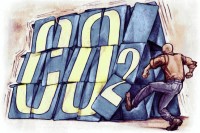
In Copenhagen, meanwhile, the United Nations’ climate-change summit went up in smoke. And in Mexico City later this year hopes for any verifiable, enforceable and legally binding agreement to reduce greenhouse gases - and to bring in developing nations such as China and India that were, insanely, omitted from the Kyoto protocol in 1997 - are a chimera.
Add to this that Washington was buried by record-breaking snowfalls last month, that hurricane activity is at a 30-year low in the U.S., that London is bracing itself for its coldest winter in decades, and that there has still been no recorded global warming this century, and it is no wonder public skepticism is rising across the world.
Nowhere is the changing climate more evident than in Australia. Last month, the Senate voted down the Labor Government’s legislation to implement an emissions-trading scheme. Polls show most Aussies oppose the complicated cap-and-trade system if China and India continue to chug along the smoky path to prosperity. The center-right Liberal-led opposition, moreover, is now led by Tony Abbott, a culture warrior who has described man-made global warming in language unfit to print in a family newspaper and cap-and-trade as “a great big tax to create a great big slush fund to provide politicized handouts, run by a giant bureaucracy.”
Until Mr. Abbott’s election as opposition leader last month, the climate debate in Australia had been conducted in a heretic-hunting, anti-intellectual atmosphere. Prime Minister Kevin Rudd claimed that climate change is the “greatest moral, economic and social challenge of our time.” In clear breach of the great liberal anti-communist Sidney Hook’s rule of controversy - “Before impugning an opponent’s motives, answer his arguments"—Mr. Rudd linked “world government conspiracy theorists” and “climate-change deniers” to “vested interests.” Much of the media, business and scientific establishment deemed it blasphemy that anyone dare question his Labor Party’s grand ambitions.
Australians had heard a lot of science, much of it poorly explained. But the “dismal science” had been conspicuously absent from the climate debate. There was very little serious analysis of the economic consequences of climate change: What choices did we have to mitigate its effects, and how much would these choices cost us? Labor ministers had emitted a lot of hot air about global warming and the urgency with which resource-rich Australia (which accounts for only 1.4% of global emissions) must act.
All of this has now utterly changed: Australia’s debate has entered a new phase, one that goes beyond the religious fervor and feel-good gestures that had held sway all too often. Suddenly, political strategists are thinking the unthinkable: far from presaging an electoral debacle that was inevitable under Mr. Abbott’s green predecessor Malcolm Turnbull, the issue could be a godsend for conservatives Down Under.
Already, Mr. Abbott - an Anglophile, Rhodes scholar, patron saint of Australian conservatives and protégé of former Prime Minister John Howard—is gaining ground in the polls. In their first test at the ballot box since they killed the government’s climate legislation last month, his Liberal Party recorded impressive victories in by-elections in Sydney and Melbourne - confounding the conventional wisdom that opposition to cap-and-trade will damage a center-right party in metropolitan seats.
In this environment, Mr. Abbott deserves praise for persuading Australia’s conservatives to fight Labor on climate change - even when the liberal wing of his own party would happily bow to Mr. Rudd. Not only will he raise the temperature over the inevitable higher costs in energy, transport and groceries under the next tax - and thus appeal to Labor’s working-class and coal mining and other energy-intensive constituencies - Mr. Abbott will also radiate the technological optimism that has characterized the human species since time immemorial. His case is not an appeal to do nothing, but to avoid doing something stupid. And unilateral Australian action in a post-Copenhagen world would be stupid: Economic Pain For No Environmental Gain. Not a bad slogan during an election scare campaign.
To be sure, Mr. Rudd remains politically popular on the back of a strong local economy that has weathered the global financial storm. But as the changing climate shows, Mr. Abbott is tapping into a more skeptical mood about climate change. If he wins the federal election later this year, Australia’s opposition leader will be a role model to conservative skeptics around the world. Read story here.
Mr. Switzer is a research associate at Sydney University’s United States Studies Centre and editor of the Spectator Australia.
By David Brown and Paul Simons, UK Timesonline
Fears over supplies of fresh milk led to the Government relaxing restrictions on delivery drivers yesterday amid reports of panic buying. Farmers were concerned that many thousands of gallons would have to be dumped because of the delays in milk tankers reaching dairies after the snow and ice.
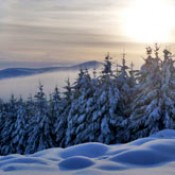
The Government has also been forced to ration dwindling grit supplies for roads, despite forecasts that the worst of the snow is over and that the thaw will start this week. Schools were urged to stay open this week so that pupils can take GCSE and A-level exams. Ed Balls, the Schools Secretary, said that it was vital that head teachers “do everything possible” to stay open to avoid disrupting exams and lessons. “I am sure that no head will take the decision to close lightly,” Mr Balls said. “It is important they take a balanced judgment and do not overstate the risks of playground slips or reduced supervision.” Ofqual, the regulator of examinations in England, said that pupils could sit their exams in the summer or their schools could apply for special arrangements to be made to arrive at an estimated grade.
The Department for Transport relaxed EU limits on working hours for drivers of milk tankers and will today review similar changes for road gritters and animal feed suppliers. Supermarkets in some areas are reported to have sold out of essentials including bread, milk and salt. Farmers were also said to be struggling to harvest vegetables in the freeze, which could lead to higher food prices. Stephen Alambritis, chief spokesman for the Federation of Small Businesses, said: “Our members have had a run on vegetables and food. The replacements have been thin on the ground. There is concern that farmers have not been able to bring the harvest in for such items as potatoes, sprouts and cabbages, which reduces the amount available to stores - and pushes up prices.”
John Hirst, chief executive of the Met Office, defended the organisation’s inaccurate seasonal forecasts, which suggested that this would be a mild winter. “These things get misunderstood,” he said. “To be honest they are sold as probabilities and the seasonal forecasts, which are young and developing, aren’t part of our operational suite.” Mr Hirst said that there would be less snow than expected over the next two days. Warm air would then push in from the South West but it was too difficult to predict whether that would bring rain or snow. Dwindling grit supplies have meant that councils have been forced to cut use by a quarter. In Buckinghamshire thieves stole 15 tonnes of grit from a council depot and Torfaen council in South Wales said that it was not refilling grit bins as drivers in large vehicles and vans had been emptying them.
The Highways Agency stopped gritting the hard shoulders on motorways in England while councils have had to ensure that main routes - for public transport, outside hospitals, schools and supermarkets - are free of ice.
About 12,000 tonnes of salt destined for Germany was diverted to Britain after an emergency request from local authorities. Fifty trucks left the Ineos salt distribution facility in Runcorn, Cheshire, yesterday, with another 50 expected today. The salt will be supplied to the worst-affected areas, including Pembrokeshire in Wales, East Yorkshire, Fife, Gloucestershire, Bradford and Sheffield.
However, there was concern that London’s economy could suffer unless the capital received more grit. Colin Barrow, the leader of Westminster City Council, said: “The West End is the economic powerhouse of London and more than 300,000 jobs are dependent on it. Businesses have had a hard enough time as it is in the recession so their recovery must not be put in further jeopardy through the national rationing of salt stocks.”
Lord Adonis, the Transport Secretary, defended the rationing, and said that it would help to keep the major road network open. The Government’s “Salt Cell” will meet today to direct the distribution of new supplies. Caroline Spelman, the Shadow Local Government Secretary, accused the Government of “rapidly losing control of the situation”.
“The Government has failed to build up a strategic Highways Agency reserve and Labour ministers have sat on their hands instead of putting measures in place to safeguard grit supplies,” she said. The National Grid lifted its latest gas supply alert after the third warning in a week. Gordon Brown insisted that supplies were not running out and that reserves could be accessed in Norway and the Netherlands.
Experts predicted that up to 90,000 deaths could be linked to the cold weather this winter (more than died in Europe in WWII when 67,000 perished!). The death rate in Britain is closely linked to the weather and for every 1C drop in temperature below 18C, the death rate increases by nearly 1.5 per cent.
Paul Wilkinson, of the London School of Hygiene and Tropical Medicine, said: “The British don’t seem to take the cold seriously enough, perhaps because we don’t usually get severe winters.” A man walking his dogs died yesterday after falling through ice while trying to rescue them from the River Tees near Stockton-on-Tees. A television executive was found dead under Penarth Pier near Cardiff on Saturday. Angharad Jones, 46, a friend of the actor Rhys Ifans, was found after going missing. She was the former commissioning editor of S4C, Channel 4 in Wales.
Icecap Note; For the first time in 50 years, it snowed down to Seville, Spain.
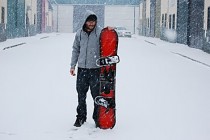
By Tom McMillin, US House of Representatives, Michigan
State Rep. Tom McMillin today questioned the use of an extremist environmental group appointed by the governor and called for an immediate disclosure by the governor for all state funds expended to this group, as well as transparency of all data and models and assumptions used.
McMillin made the call following a plan from the global-warming advocacy group the Center for Climate Strategies that likely overstated possible job growth and will cost Michigan taxpayers millions of dollars to follow a political agenda.
“To expend taxpayer money on such a biased group as CCS was just wrong and exemplifies how Governor Granholm has run this state into the ground - by putting political agendas ahead of truth and Michigan job creation,” said McMillin, R-Rochester Hills. “There will not be a net 129,000 jobs created. To follow the recommendations of this study may actually result in net job losses for Michigan.”
McMillin noted the long history of questionable action from the Center for Climate Strategies that can be found here.
“The report is intentionally false in order to promote CCS’s radical agenda, which always conveniently leave out costs to taxpayers and job providers,” McMillin said. “The results of this so-called study is as bogus as the far left group the governor chose to stage this charade - that group, CCS, is closely aligned with scientists who hide data, delete emails and contrive to bully peer review methods in order to promote their radical, non-scientific, highly questionable agenda. In effect, Michigan now has its own version of Climategate. Let’s see if, in Michigan, they’ll come clean or hide.”
H/T Paul Chesser.
-----------------------------
Gore’s Books Can Alleviate Humanitarian Crisis: Book Burning Will Warm Freezing Britons
By Myron Ebell, Freedom.org
Washington, DC., January 8, 2009 - It has been reported in the London press that poor old-age pensioners are having to resort to buying books at thrift shops to burn to keep warm during the prolonged bitterly cold weather in the United Kingdom. In response to this humanitarian crisis, Freedom Action is calling on former Vice President Al Gore to join an effort to collect and airlift copies of his science fiction bestsellers to British people in dire need.
“We are collecting copies of Al Gore’s An Inconvenient Truth, Our Choice, and Earth in the Balance and will send them to Oxfam in the UK to distribute for free to vulnerable people trying to survive the cold weather,” said Myron Ebell, Director of Freedom Action. “We call on Mr. Gore to co-operate in our effort to relieve human suffering by providing copies of his books for burning in stoves and fireplaces.”
“It is appropriate that Al Gore’s books should be used to help keep poor people warm,” Ebell explained, “since the principal reason the British government is totally unprepared to deal with the brutally cold weather is because they have fallen for the global warming myths propagated by Gore himself in his bestselling books. Burning Gore’s otherwise worthless books to keep people from freezing is their highest and best use.” Read more here.
------------------------------
Britain suffers coldest night as freeze deepens
By Mirror.co.uk, January 8, 2010
Britain’s big freeze deepened today after the snow-bound country suffered its coldest night of the winter so far. Temperatures in some areas were plummeting towards minus 20C (minus 4F) - several degrees colder than a domestic freezer - and heralding another day of major disruption for transport, schools and businesses.
The relentless cold weather has brought more havoc with dozens of big companies having their gas rationed after domestic demand soared to record levels and warnings that many grit stocks were reaching crisis point.
Icy conditions have again left roads in a treacherous state across virtually the whole country and caused problems for rail and air passengers. There will be little respite during the day, with more snow for eastern England and temperatures likely to be pegged at or below freezing in all parts.
The wintry conditions are also expected to last well into next week. Gareth Harvey, from MeteoGroup, the weather division of the Press Association, said: “There is no change in the weather pattern - it is very cold and icy again. See list of the coldest winters in the UK here.
Snow brings A3(M), one of Britain’s busiest motorways, grinding to a halt
By Euan Stretch and Victoria Ward, January 7, 2010
Hundreds of drivers were last night trapped in a 10-MILE tailback as snow brought one of Britain’s busiest motorways grinding to a halt. Up to 1,000 vehicles were feared to have been snared in the gridlock - some stuck for up to 15 hours - as the area was buried under 12in of snow.
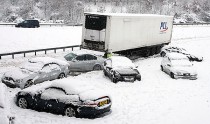
But efforts to bring in snow ploughs to clear the chaos were hampered as some drivers abandoned their vehicles on the A3(M) and walked. Eight months pregnant Carla Holt, 23, and 13-month-old Lily-May were trapped for 12 hours on the motorway near Petersfield, Hants. Carla, heading home to Selsey, West Sussex, said: “We Mum-of five Nikki Thomas, 32, and her 10-month-old daughter Alexia went through hell. I couldn’t go to the toilet all night and couldn’t warm the bottle up for my baby. It was very frightening."spent nine hours on the A3 near Petersfield as they returned to London.
She said: “I didn’t know if I had enough milk to last and was running out of petrol. It was terrible not knowing when it was going to end. “People were abandoning cars, even in the fast lane, which stopped snow ploughs getting through.” The 12in of snow that fell on Hampshire on Tuesday night and early yesterday was the heaviest there since 1981.
But the whole country shivered in sub-zero temperatures yesterday. The Met Office said the coldest spot in the UK was Woodford, Stockport, in Greater Manchester, with a reading of -14.9C. Raf Benson, in Oxfordshire, was second with -14.2C. Aboyne in Aberdeenshire was -13C.
Reading, Berks, had 10.5in of snow, with up to 11in in parts of East Anglia and the South East. Business experts fear the cold snap could cost the economy 2billion pounds this week alone, with half of all workers feared to have stayed home yesterday.
Weathermen warn the freeze will continue well into next week. Gareth Harvey, from MeteoGroup, the weather division of the Press Association, said: “There is no change in the weather pattern - it is very cold and icy again. See list of the coldest winters in the UK here.
Snow brings A3(M), one of Britain’s busiest motorways, grinding to a halt
By Euan Stretch and Victoria Ward, January 7, 2010
Hundreds of drivers were last night trapped in a 10-MILE tailback as snow brought one of Britain’s busiest motorways grinding to a halt. Up to 1,000 vehicles were feared to have been snared in the gridlock - some stuck for up to 15 hours - as the area was buried under 12in of snow.

But efforts to bring in snow ploughs to clear the chaos were hampered as some drivers abandoned their vehicles on the A3(M) and walked. Eight months pregnant Carla Holt, 23, and 13-month-old Lily-May were trapped for 12 hours on the motorway near Petersfield, Hants. Carla, heading home to Selsey, West Sussex, said: “We Mum-of five Nikki Thomas, 32, and her 10-month-old daughter Alexia went through hell. I couldn’t go to the toilet all night and couldn’t warm the bottle up for my baby. It was very frightening."spent nine hours on the A3 near Petersfield as they returned to London.
She said: “I didn’t know if I had enough milk to last and was running out of petrol. It was terrible not knowing when it was going to end. “People were abandoning cars, even in the fast lane, which stopped snow ploughs getting through.” The 12in of snow that fell on Hampshire on Tuesday night and early yesterday was the heaviest there since 1981.
But the whole country shivered in sub-zero temperatures yesterday. The Met Office said the coldest spot in the UK was Woodford, Stockport, in Greater Manchester, with a reading of -14.9C. Raf Benson, in Oxfordshire, was second with -14.2C. Aboyne in Aberdeenshire was -13C.
Reading, Berks, had 10.5in of snow, with up to 11in in parts of East Anglia and the South East. Business experts fear the cold snap could cost the economy 2billion pounds this week alone, with half of all workers feared to have stayed home yesterday.
Weathermen warn the freeze will continue well into next week, with Eastern England and Scotland bearing the brunt of it today and tomorrow.
By Martin Evans, UK Telegraph
See John Hirst, head of the Met Office, defends the record of the weathermen after they predicted a mild winter. Andrew Neil asked him to justify his salary which is higher than the prime minister’s here.
The Met Office issued an emergency weather warning for the entire country as parts of Britain prepared for some of the heaviest snowfall in almost 50 years. The South, including London and the Home Counties, was expected to bear the brunt of the snowfall overnight and early on Tuesday, with emergency services saying that they were already struggling to cope with the increasingly bitter conditions. On Tuesday, up to eight inches of snow fell in some parts of the country.
It brought chaos to schools, businesses and transport networks. Scores of rail services and flights were cancelled as temperatures struggled to get above freezing. On Monday night, temperatures dropped to as low as -14C (7F) in some areas - the worst since 1995.
More than 1,000 schools were closed in Scotland, the north of England and Wales. Forecasters predicted that more than a foot of snow could fall in less than 24 hours in most southern areas, leading to widespread disruption for millions. The residents of Hampshire and Wiltshire were expected to be the worst hit, with as much as 16 inches likely to be dumped by the end of Tuesday.
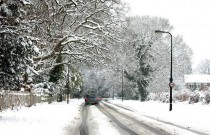
Commuters in London, which ground to a halt last February after heavy snowfalls, were warned to expect a covering of several inches by the morning rush hour. Drivers were advised to only make essential trips, as councils gave warning that they could run out of grit.
Business groups estimate that the absenteeism from the snow could cost up to 2billion pounds sterling with the Federation of Small Businesses estimating that about 10 per cent of the workforce unable to get to work on Tuesday.
The Met Office said the forecast snow could be the biggest single fall since the notorious winter of 1962-63. A Met Office spokesman said it had issued a so-called “flash warning” because of the substantial quantity of snow that was expected to fall in a short period of time. “This kind of warning is very rare. It’s the level of alert we put out for the floods in the summer of 2007,” the spokesman said.
Forecasters said that there would be little respite over the next week as freezing temperatures continue to grip Britain. The Met Office said the country was experiencing the longest cold snap since 1981. A change in wind direction has caused the prolonged freezing spell, it said. Britain’s prevailing winds usually bring weather from the west, but for the past few weeks the wind has blown from the north and east, bringing Arctic weather.
Emergency services were told to “prepare for the worst”. In some hard-hit areas, the services admitted that they were losing the battle against the weather. The police in Manchester asked the public to dial 999 only if there was a life-threatening emergency or a crime was taking place, while the North West Ambulance Service said it would dispatch crews to life-threatening cases only. Gordon Brown said the Government was doing everything possible to keep the country moving. “The weather is taking a turn for the worse,” the Prime Minister said. Icecap Note: so is your credibilty Mr PM “We are doing everything possible to keep disruption to a minimum. The Highways Agency has kept the vast majority of major road networks running.”
All flights at Gatwick, Luton, Birmingham and Southampton airports were cancelled last night as workers rushed to clear snow from runways. Other airports including Manchester Airport and the John Lennon Airport in Liverpool closed temporarily. Heathrow was operating normally although many of the roads around it were blocked.
There were also fears that gas supplies could begin to run low if the icy conditions continued. Figures obtained by the Conservatives suggested that, under the current levels of usage, supplies would only last for another week. Read more here.
------------------------
Freezing Weather’s Effects on Oil, Orange Juice, Skiing and Good Cheer
By Jonathan Berr
Last year, New Hampshire’s Omni Mt. Washington Resort had its third-best year ever, despite a mild wild winter. This year, the resort, which includes the state’s largest ski area, Bretton Woods, is expecting to do better. “We just yesterday received 30 inches of snow,” says Craig Clemmer, director of sales and marketing at the resort. “To be honest, it’s a blessing. To have this amount of powder out there is an incredible thing.”
Bookings at the 360-room resort remain above last year, making it difficult for weekend skiers to plan their getaways. Weekdays, when groups attend, have been strong as well at the 434-acre resort, voted “Top 5 in the East for Weather” by Ski magazine for four years in a row. The resort is not sold out, Clemmer says.
So far, the East Coast has had a bitterly cold winter—there’s no debating that. Temperatures were below normal throughout the region between New York City and Atlanta, says Mike Pigott, meteorologist at AccuWeather, who says the extreme cold is likely to linger through February.
Global Warming Means Big Blizzards
And the cold snap would be worse if not for global warming, says Brenda Ekwurzel, a climate scientist from the Union of Concerned Scientists. In fact, she says, “Blizzards and big snowfalls are entirely consistent with global warming,” because warmer air traps moisture in clouds, leading to more intense blizzards.
The impact of this year’s unseasonably cold weather has been a boon for some sectors of the economy, even as it drags down others. Oil has hit $81 a barrel for the first time in two months, and Bloomberg News notes that stockpiles of heating oil have fallen for six weeks, to 44.4 million barrels—the longest decline since April 2008. The run is fueled in part by record low temperatures in areas like International Falls, Minn. Known as “the Icebox of the Nation,” the town recently hit minus 37 degrees Fahrenheit. And further south, orange-juice prices soared 90% in 2009, fueled by an unseasonably cool winter in Florida, the world’s second-biggest orange grower after Brazil.
But a nasty winter doesn’t mean all costs go up. Ohio officials report that road salt is cheaper and easier to find after towns got burned by shortages last year. The Dayton Daily News says Streets Department officials are saving money by using the ice-melting agent more efficiently. In the U.K., though, officials are worried about “critically low” supplies.
Coffee Earnings Rise
Of course, it wouldn’t be winter without warm beverages, and shares of Starbucks (SBUX) are up more than 134% over the last year. Smaller rival Green Mountain Coffee Roasters (GMCR) is up more than 212%, thanks to the surging popularity of its Keurig single-cup coffeemakers. (I think mine is particularly awesome, and judging by the difficulty I had in finding some flavors. so do other consumers.)
Those who aren’t worried about the supply of salt or the cost of heating oil are enjoying the wintry wonderland. Chris Hustad, owner of Nodak Outdoors in Bismarck, N.D., says he plans to go ice-fishing today and that his fellow enthusiasts would angle through a frozen lake “come hell or high water.” And the cold doesn’t bother the 6,700 people who live in the Icebox of the Nation. Rod Otterness, city manager of International Falls, says he prefers bone-chilling but calm days like Jan. 4’s to windier, warmer days. (Tuesday’s high temperature is predicted to reach 3 degrees Fahrenheit.)
“Everybody is driving down the street,” Otterness says. “Trees are absolutely gorgeous with ice crystals. What’s nice about International Falls is that we don’t get that slushy stuff.” Read more here.


